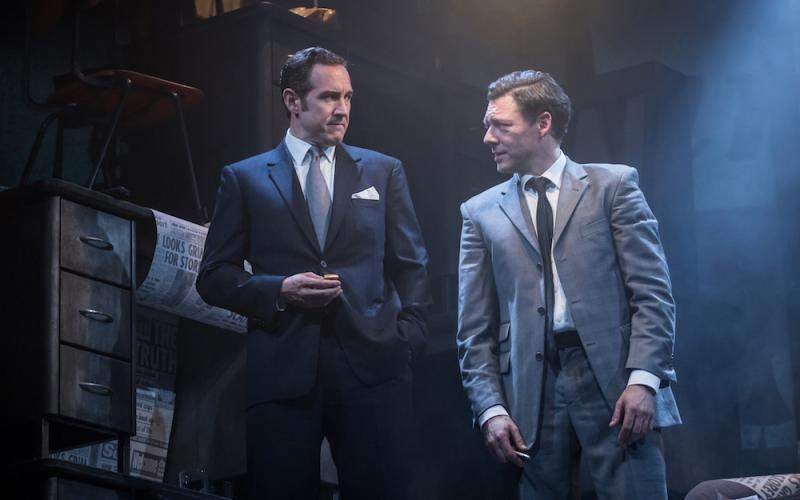
James Graham’s shrewd take on the creation of The Sun takes the audience into the very heart of a British publishing house, writes Sophie Killip
After a sell-out world premiere at the Almeida, James Graham’s Ink has settled triumphantly into its West End venue, The Duke of York’s Theatre. Intimate and close, the curtain rises to a dark stage; two beams of light silhouette shadowy figures who discuss the power of stories and what’s important when telling them – who, what, when, where, why. Behind them, the letter ‘W’ appears in the dark with each question, captivating us with a whoosh.
The lights rise and the men go to dinner; Larry Lamb sits across the table from an Australian entrepreneur who is just about to purchase a failing newspaper from the Mirror Group. The newspaper? The Sun – the Australian? Rupert Murdoch; Bertie Carvel’s depiction is squinting, hunched, fingers curled and head tilted to one side, like the wind changed and fixed it there. He is cool, sly, and instantly dislikeable – but his words feel like honey, and there is no questioning his intelligence.
Just as confident on the stage is Richard Coyle, as the slightly less self-assured Larry Lamb, plucked from his job at the Mirror and wary of this underhand meeting. Slick- haired and strongly northern, Lamb is equally seduced by the idea of being Editor of his own newspaper and baffled by what Murdoch is proposing: a completely fresh, original newspaper going into circulation after a turn around of only two days. Murdoch wants something ‘fun’, and on that front, Ink certainly delivers.
We are launched head first into smoke-riddled Fleet Street, the static set reaching into the ceiling with stacks of newspapers used as stairs and seats, and desks piled on top of each other made to form The Sun’s tiny basement offices. Typewriters create the base layer of a score that follows Ink from beginning to end, the music much more involved with the narrative than what one would assume from a straight play – and it is unapologetically catchy.
Much like the newspaper Lamb and Murdoch are trying to create, Ink is anything but traditional; sprinkled within meaty dialogue, there are dances, singing, and visual effects – staged and on screens – that transport the audience into the very heart of a publishing house. Ink drips down desk sides and literally splatters into the audience, smeared over Lamb’s face like he’s just committed murder. Projected photographs and articles loom above the set to enhance the scene below, reminding the audience why we are there. At any moment, if the eye strays from the central cast, it will be to explore the intricate set, or the tableau that the ensemble has created under Rupert Goold’s direction.
Exquisitely British, the creation of The Sun as we know it today is a story worth telling, told in the most extraordinary of ways. Comedic, shrewd and heaping on the cigarette smoke – after all, this is 1969 – Ink could very well become as iconic as Murdoch’s newspaper, if perhaps a little more refined than Page 3.
Related






